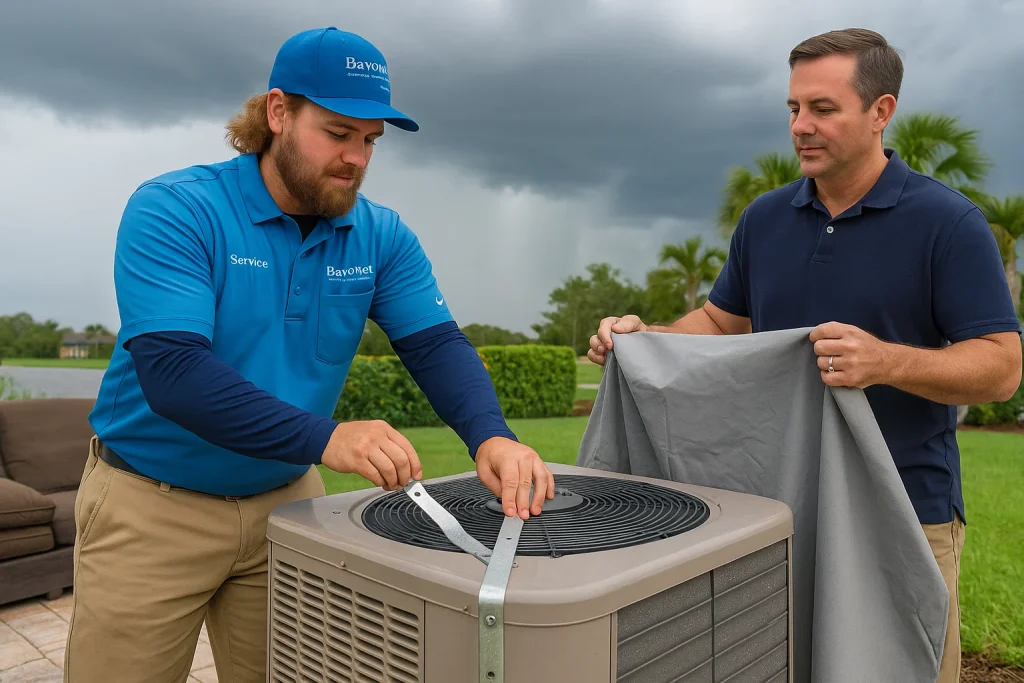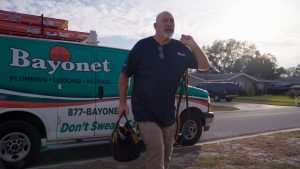Florida homeowners know that when storm season arrives, preparation is key. But one area many homeowners overlook is their HVAC system. Taking steps to protect it before and after a storm can help you avoid costly repairs, improve indoor comfort, and extend the life of your system. Preparing ahead of time helps protect both your equipment and your comfort. It can also save you from unnecessary downtime during Florida’s hot and humid hurricane season.

Why HVAC Preparation Matters During Storm Season
When a storm approaches, your air conditioner or heat pump can be vulnerable to multiple types of damage. High winds can turn branches, patio furniture, or even roof shingles into projectiles that dent or damage your outdoor unit. Heavy rainfall and flooding can submerge electrical components. And sudden power outages or surges can fry sensitive parts, leading to costly repairs or even full replacement.
Beyond mechanical damage, storm-related moisture can create the perfect environment for mold and mildew inside your system. This can lead to poor indoor air quality and unpleasant odors. For example, after a heavy storm, some homeowners notice their AC smells like vinegar in Brooksville, a common sign of bacterial or mold growth caused by excess moisture inside the unit.
Pre-Storm HVAC Protection Tips
The best time to protect your system is before the weather gets rough. A few preventive steps can go a long way toward minimizing storm damage:
- Turn Off the System: Shut down your HVAC system at the breaker before the storm to avoid damage from power surges.
- Secure the Outdoor Unit: Tighten bolts, add hurricane straps, or install a wind barrier to prevent the unit from shifting or tipping.
- Cover the Condenser: Use a breathable cover or tarp to shield the system from flying debris, but never operate it while covered.
- Clear the Area: Remove patio furniture, planters, or anything that could become a projectile.
These steps may only take a few minutes, but they can make a significant difference in protecting your system from storm damage.
Preventing Long-Term Storm Damage
While immediate prep and post-storm steps are crucial, long-term strategies can help keep your HVAC system safe season after season.
1. Install a Surge Protector or Whole-Home Generator
Power fluctuations are one of the most common causes of storm-related HVAC damage. A surge protector can prevent costly electrical failures, while a generator ensures your system can run safely during extended outages.
2. Elevate Your Outdoor Unit in Flood-Prone Areas
Raising your unit above typical flood levels can reduce the risk of water damage, especially in coastal and low-lying communities.
3. Keep Up With Regular Maintenance
Routine inspections and tune-ups help keep your system strong against Florida’s unpredictable weather. A well-maintained system is less vulnerable to damage and easier to restore after a storm.
If you’re unsure where to start or want professional help storm-proofing your HVAC system, schedule a service visit with our team. Proper preparation today can keep your home cool and comfortable long after the storm has passed.
It’s No Sweat: Call Bayonet! Contact Bayonet Plumbing, Heating & Air Conditioning to schedule an AC inspection in Brooksville, FL today!

